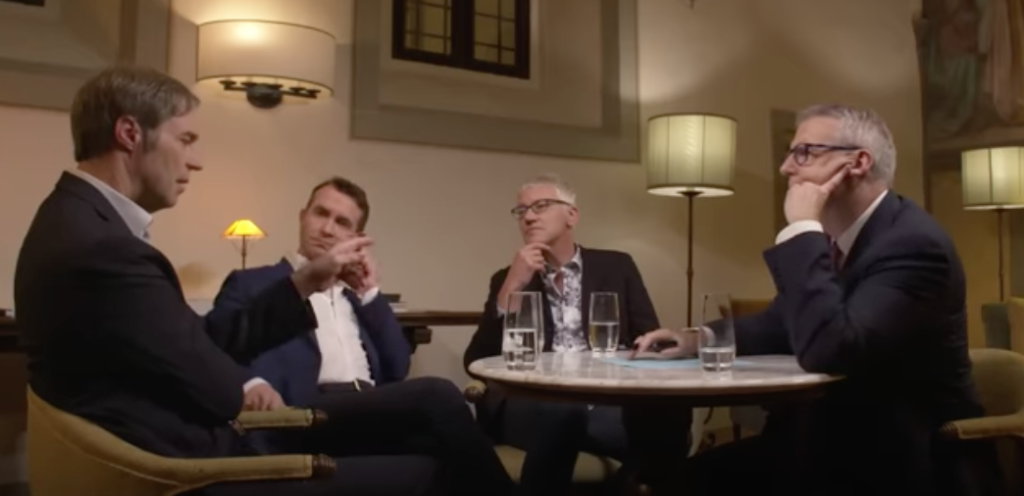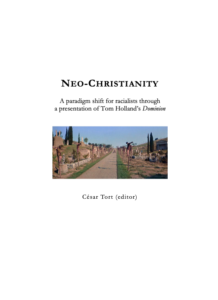Christian morality is the seedbed that makes today’s secular West what it is, and for contemporary American racialists the hardest pill to swallow is that their movement has failed because of Christianity. And it will continue to fail unless they become true apostates, not only apostates from Christian dogma but also of the axiological side of Christianity: the so-called secular side. After all, ‘secular’ is just the tricky term St Augustine chose for his theological system, used even in our modern world, when in fact the ‘secular’ and the ‘religious’ have always been two sides of the same cultural coin.
Any racialist movement was doomed from the start, is doomed and will be doomed to failure unless it is understood that Christianity, or more specifically Christian morality, has always been the Devil for the white man. This includes the morality of today’s atheists whose worldview we here call Neo-Christian.
Only by telling us the story of the white race as it really happened in the Greco-Roman world (and here we can think of some essays from The Fair Race), together with elementary historical facts such as the non-existence of Jesus that Richard Carrier talks about, and how the New Testament was authored by Jews as David Skrbina believes, will it be possible to modify the collective unconscious of the white man—especially if we add to that a few pages from Karlheinz Deschner’s Criminal History of Christianity and the history of the Holocaust committed by the Allies, so well described in Tom Goodrich’s Hellstorm. The psychohistorical work of Tom Holland, who has lost faith in traditional Christianity is also pivotal even if, as a typical British liberal, he is our ideological enemy. But let’s use him as a useful idiot!
Holland hit the nail on the head when he said that National Socialism has been the most radical movement since Constantine, especially because it rebels against St Paul’s idea that there is no difference between Jews and Greeks (transformed today in the religious belief that there is no difference between blacks and whites): the original mental virus that caused the inversion of values. Holland also points out that the National Socialists repudiated the very essence of the emblem of the Cross: that a crucified victim is more morally worthy than the crucifying Romans. This idea persists in our times during mass hysteria phenomena such as the Black Lives Matter (BLM) riots of 2020 surrounding the death of George Floyd when countless whites, even outside the US, bent the knee before primitive negroes in the most humiliating way!
Holland has said in several interviews that the central emblem of Western civilisation, Christ on the Cross (now downtrodden negroes on ‘crosses’) provides a moral framework for understanding the Woke phenomenon. Before reading Dominion, in ‘On empowering carcass-eating birds’ in my book Daybreak I had already said that empowering transgender people was a kind of neo-Franciscanism, in reference to St Francis of Assisi (‘let’s love and kiss the new leper’), and quoted the biblical passage that the last shall be first and the first last. Analogously, speaking about whites bending the knee after the BLM riots, Holland has said that this grotesque self-debasement ultimately goes back to the Gospel narrative of the Passion, ‘to that very, very primal image of a man tortured to death by an oppressive state apparatus: Jesus on the cross.’ Not only at the end of Dominion but in his lectures this London historian has also said that a thoroughgoing rejection of Christianity would allow us to return to the ways of the blond beast. (As axiological enemies of Holland, we would add that the first thing this beast would do will be to drive the millions non-whites out of their lands and punish the recalcitrant as the Romans did in the Appian Way.) In a home interview with a conservative Australian, Holland added:
The modern who has more profoundly and unsettlingly understood just how radical that idea is—how radical the idea that the Cross, of all things, should become the emblem of the new civilisation—, was a man who was not just an atheist but a radical hostile, anti-Christian atheist: Friedrich Nietzsche. Nietzsche said: this is a repellent thing. Nietzsche identified with the power and the glory and the beauty of classical civilisation; and he thought that Christianity, notoriously, was a religion for slaves. And he saw in the emblem of Christ nailed to the Cross a kind of disgusting subversion of the ideals of the classical world: a privileging of those who properly should be ground beneath the heels of the mighty. And he saw it as a kind of sickness that then, it kind of infected the blond beast as he called it: that the primordial figure of the warrior gets corrupted and turned into a monk, a monkish figure who is sick with poverty and sympathy for the poor and the oppressed…
Fascism, I think, was the most radical revolutionary movement that Europe has seen since the age of Constantine because unlike the French Revolution, unlike and the Russian Revolution, it doesn’t even target institutional Christianity: it targets the moral-ethical fundamentals of Christianity. The French Revolution, the Russian Revolution are still preaching that idea that the victim should be raised up from the dust and that the oppressor should be humbled into the dust; it’s still preaching the idea that the first should be last and the last should be first just as Christ has done.
The Nazis do not buy into that.
In the post-WWII world westerners culminated the inversion of healthy values that started with Constantine. They enshrined the privileges of the unprivileged and the universality of all human beings—orc immigrants included—because they now live in the shadow of what enshrined the opposite: Hitlerism; and, given their Christian programming, that scares them. As Holland said at the end of another interview, ‘to cling to the idea that, say, racism is the ultimate sin is still for deeply Christian reasons. It’s possible to imagine a different world in which the strong are powerful and in which the world is divided into the civilised and the barbarians because that’s what the Ancient World was like, and that’s what the Nazis enshrined. It’s perfectly possible. The fact that we regard them as abhorrent I think is testimony of how Christian we remain.’
What Angela Merkel did, opening the doors to two million refugees in anti-Nazi Germany, is ultimately an extreme form of following the parable of the Good Samaritan. Always keep in mind that Jesus didn’t exist but that some Jewish rabbis, the mythmakers, wrote the New Testament. No racialist movement that fails to see this can succeed because despite their rabid anti-Semitism racialists continue to, ultimately, obey the Jews who wrote the NT. They are jew-obeyers. They all live, atheists included, under the moral sky bequeathed to us by the mighty archetype of ‘God on the Cross.’ And outside racist forums, the attempt to make not only the dispossessed blacks but poor transexual people the first, and the healthy white man the last, is but the final metastasis of an inversion that began to take root in our collective unconscious as early as the 4th century of the Common Era.
For decades, in my soliloquies I have often said to myself: ‘A fish cannot criticise water.’ We live in a matrix. Without knowing it or recognising it, secular humanists have been swimming in Christian waters since what misleadingly they call the Age of Enlightenment (actually a ‘Dark Enlightenment,’ as some right-wing intellectuals have pointed out). Ultimately this whole issue of ‘human rights’ is nothing more than a transposition to the legal plane of the Pauline ideas that there is no difference between Jew and Greek, woman and man. In the Athenian democracy only the native males of Attica had the right to vote. Neither slaves nor women nor mudblood foreigners could do so. The assumption that we owe modern democracy to the Greeks is false: we owe it to Christian mandates. Furthermore, modern westerners commit what I call, again in my soliloquies, the psychological fallacy of ontological extension. They believe that all cultures share their humanitarian values when not even the ancient Greeks, the Romans or Norsemen did; let alone billions of contemporary Muslims, Chinese or Hindus. In Holland’s words, ‘the conceit of the West is that it has transcended Christianity to become purely universal; purely global, and therefore it can market itself in those terms. But its values, its assumptions, its ethics remain palpably bred of the marrow of Christianity.’
The term catholic derives from the Greek, katholikos. If we translate ‘universal human rights’ into the Greek of the first centuries of our era, we would be talking about ‘catholic human rights’ insofar as catholic means precisely universal in the sense of no longer making distinctions between Jew and Greek, woman and man, slave and free man: all are now equal in the eyes of a Semitic god. Human rights are catholic in this universal sense. Hitler targeted the idea there exists such a thing as universal human dignity, as well as the idea that the first should be last. From his viewpoint, our viewpoint, and I am talking to those who will read Savitri Devi’s Memories and Reflections of an Aryan Woman, or our books Day of Wrath and On Exterminationism, there is no such a thing as rights. Only the moral duty to dispose of the obsolete versions of Homo sapiens. This is the ultimate repudiation of the Christian heritage. And the horror that most westerners feel at the figures of Hitler and Himmler is nothing other than their continued enslavement to the archetype of the Jew on the Cross which they are still unable to exorcize from their psyches, even if this symbolic ‘Jew’ now takes other forms.

If we see Christianity and the French Revolution’s human rights as two sides of the same axiological coin, let us venture to say that the perfect symbol of our counter-revolution would be for thousands of blonde beasts starting to wear T-shirts emblazoned with Himmler’s face while burning churches, crucifying those who tried to destroy their race and wiping their asses with the remains of the pages of the now destroyed Bibles all over the West, but especially in the US. And the Arc de Triomphe in Paris, which symbolises the historic inauguration of Neo-Christianity, must be razed to the ground as well.
As Nietzsche would say, Umwertung aller Werte!







